Let's talk about the vocabulary of a foreign language
How many words are in English? The Oxford English Dictionary contains about 500,000 entries, not taking into account specific scientific words and phrases (of which there are about 500,000). What do you think, what is the average vocabulary of a foreign language gives you a high school during your studies? The correct answer is about 2500 words. Is it enough of this set? Here it is necessary to proceed from your goals. To communicate with foreigners on business topics - definitely not enough. To read simple texts on the Internet is more than enough. To be more precise:
400–500 words - active vocabulary for language proficiency at the basic (threshold) level.
800–1000 words - active vocabulary for explaining; or passive vocabulary to read at a basic level.
1500–2000 words - an active vocabulary, which is enough to provide everyday communication throughout the day: or passive vocabulary, sufficient for confident reading.
3000-4000 words - in general, enough for almost free reading of newspapers or specialty literature.
About 8,000 words - provide full communication for the average European. Virtually no need to know more words in order to communicate freely both verbally and in writing, as well as read literature of any kind.
The well-known Swedish polyglot Eric Gunnemark, the founder of the International Association Amici Linguarum (Friends of the Languages), came to these data. Moreover, he made a set of the minimum number of words and expressions that need to be known for the threshold level of language proficiency, calling them Minix and Minifraz.
')
Interestingly, what is the average level of vocabulary for an ordinary user of the network and for you personally? I will tell about it further.
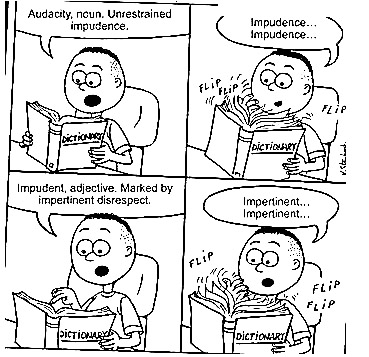
As a result of a study conducted by the joint American-Brazilian group, interesting results were identified. For example, the graph below shows how vocabulary increases with age in native speakers (in this case, English).
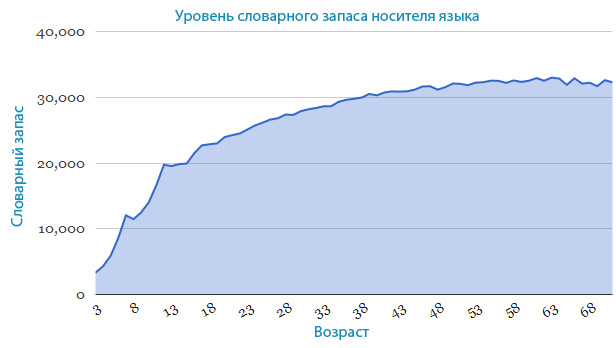
200.000 people took part in the survey, which indicates its high accuracy. From the graph it is clear that between 3 and 16 years our vocabulary is growing at a rate of 4 new words per day (to be more precise, 3.8 words). At the age of 16 to 50 years, the growth rate is reduced to 1 per day (more precisely, 0.85). Finally, after 50 the vocabulary remains at about the same level.
And what is the average stock of English words for Internet users for whom English is not native? The chart below will answer this question.
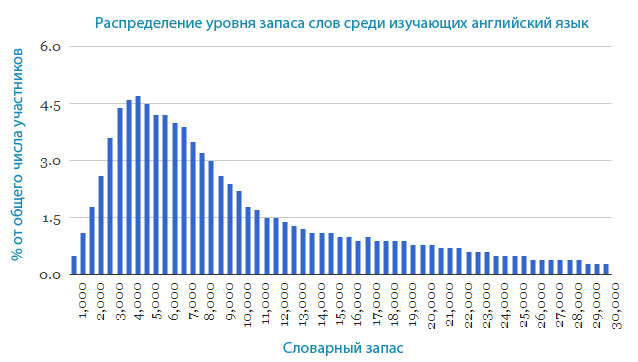
It does not include users with a margin of words below 1000. As we can see, the majority of users who learn English (4.7%) have a personal vocabulary of 4,500 words. You can check your level of knowledge in just a couple of minutes (link at the end of the article) and compare it with these indicators.
Let's look at some other interesting findings. The following diagram shows the activity of students in classroom activities (answers to questions, communication) from the level of vocabulary.
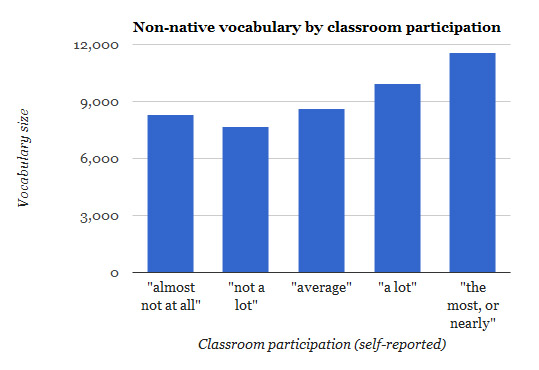
As expected, students with the best knowledge of words participate most actively in the lesson process, but this is not a fundamental factor.
The following diagram answers the question: how often do you use knowledge of the English language in life (when watching TV, traveling, listening to songs, etc.)
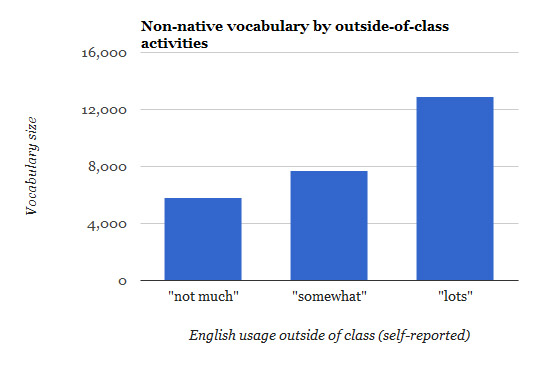
Again, with the growth of vocabulary, students more often begin to use the language in everyday life, and those who encounter English often have twice the vocabulary.
If you traveled to English speaking countries, how long have you been there?

From the diagram, we see that people with a stock of 7,000 to 10,000 words are abroad for a total of less than a year. Each subsequent year of being in an English-speaking country adds an average of 850 words to your initial supply, which corresponds to 2.35 words per day (compared to an American teenager, whose vocabulary increases by 0.85 words per day).
• Do regular exercise. A little bit of daily is better than once a week for several hours in a row.
• Carry printed word cards with you, or use appropriate mobile applications.
• Read as much as you can, even if the text is poorly perceived (I recommend reading this book by Nikolai Zamyatkin, who advises learning to read texts without using a dictionary).
• Learn as much as possible by heart.
• Stick stickers on various items in the room with English meaning and translation.
• Repeat words regularly, preferably pronouncing them out loud. Even Russian words are forgotten if they are not repeated for a long time and not used.
• For difficult-to-remember words, use associations. The brighter the image created by the association, the better to remember the word.
• Language is a fortress, and it must be attacked from all sides and by all means, therefore any practice is the basis of success, therefore use the slightest opportunity to speak, read, write in the language being studied.
• Do not be afraid of mistakes. Learn from them! Excessive modesty does not help here, and some self-confidence does not hurt.
• Use the time that is usually hopelessly wasted - travel in public transport, waiting for reception, etc.
• Vocabulary site material was used for the article: http://testyourvocab.com
• An example of a good dictionary of the basic vocabulary is the dictionary released by E. Klett in Stuttgart, 1971, entitled “Grundwortschatz Deutsch” (“Basic German word fund”). It contains 2,000 essential words in each of the six selected languages: German , English, French, Spanish, Italian, and Russian.
• The book by E. Gunnemark, in which he talks in more detail about learning words, is called “The Art of Learning Languages.” It is difficult to find on sale (in Moscow Biblio-Globus has been missing since 2005). Therefore, I recommend downloading the electronic version .
• The course Mininlex and Minnebraz Gunnemark , as well as 2000 most used English words , can be passed on the vocabulary site WordSteps
• Book N. Zamyatkin: “ You can not teach a foreign language ” is recommended to respect for beginners to learn the language.
400–500 words - active vocabulary for language proficiency at the basic (threshold) level.
800–1000 words - active vocabulary for explaining; or passive vocabulary to read at a basic level.
1500–2000 words - an active vocabulary, which is enough to provide everyday communication throughout the day: or passive vocabulary, sufficient for confident reading.
3000-4000 words - in general, enough for almost free reading of newspapers or specialty literature.
About 8,000 words - provide full communication for the average European. Virtually no need to know more words in order to communicate freely both verbally and in writing, as well as read literature of any kind.
The well-known Swedish polyglot Eric Gunnemark, the founder of the International Association Amici Linguarum (Friends of the Languages), came to these data. Moreover, he made a set of the minimum number of words and expressions that need to be known for the threshold level of language proficiency, calling them Minix and Minifraz.
')
Interestingly, what is the average level of vocabulary for an ordinary user of the network and for you personally? I will tell about it further.

As a result of a study conducted by the joint American-Brazilian group, interesting results were identified. For example, the graph below shows how vocabulary increases with age in native speakers (in this case, English).

200.000 people took part in the survey, which indicates its high accuracy. From the graph it is clear that between 3 and 16 years our vocabulary is growing at a rate of 4 new words per day (to be more precise, 3.8 words). At the age of 16 to 50 years, the growth rate is reduced to 1 per day (more precisely, 0.85). Finally, after 50 the vocabulary remains at about the same level.
And what is the average stock of English words for Internet users for whom English is not native? The chart below will answer this question.

It does not include users with a margin of words below 1000. As we can see, the majority of users who learn English (4.7%) have a personal vocabulary of 4,500 words. You can check your level of knowledge in just a couple of minutes (link at the end of the article) and compare it with these indicators.
Let's look at some other interesting findings. The following diagram shows the activity of students in classroom activities (answers to questions, communication) from the level of vocabulary.

As expected, students with the best knowledge of words participate most actively in the lesson process, but this is not a fundamental factor.
The following diagram answers the question: how often do you use knowledge of the English language in life (when watching TV, traveling, listening to songs, etc.)

Again, with the growth of vocabulary, students more often begin to use the language in everyday life, and those who encounter English often have twice the vocabulary.
If you traveled to English speaking countries, how long have you been there?

From the diagram, we see that people with a stock of 7,000 to 10,000 words are abroad for a total of less than a year. Each subsequent year of being in an English-speaking country adds an average of 850 words to your initial supply, which corresponds to 2.35 words per day (compared to an American teenager, whose vocabulary increases by 0.85 words per day).
Few effective tips for learning words
• Do regular exercise. A little bit of daily is better than once a week for several hours in a row.
• Carry printed word cards with you, or use appropriate mobile applications.
• Read as much as you can, even if the text is poorly perceived (I recommend reading this book by Nikolai Zamyatkin, who advises learning to read texts without using a dictionary).
• Learn as much as possible by heart.
• Stick stickers on various items in the room with English meaning and translation.
• Repeat words regularly, preferably pronouncing them out loud. Even Russian words are forgotten if they are not repeated for a long time and not used.
• For difficult-to-remember words, use associations. The brighter the image created by the association, the better to remember the word.
• Language is a fortress, and it must be attacked from all sides and by all means, therefore any practice is the basis of success, therefore use the slightest opportunity to speak, read, write in the language being studied.
• Do not be afraid of mistakes. Learn from them! Excessive modesty does not help here, and some self-confidence does not hurt.
• Use the time that is usually hopelessly wasted - travel in public transport, waiting for reception, etc.
It is useful to pay attention
• Vocabulary site material was used for the article: http://testyourvocab.com
• An example of a good dictionary of the basic vocabulary is the dictionary released by E. Klett in Stuttgart, 1971, entitled “Grundwortschatz Deutsch” (“Basic German word fund”). It contains 2,000 essential words in each of the six selected languages: German , English, French, Spanish, Italian, and Russian.
• The book by E. Gunnemark, in which he talks in more detail about learning words, is called “The Art of Learning Languages.” It is difficult to find on sale (in Moscow Biblio-Globus has been missing since 2005). Therefore, I recommend downloading the electronic version .
• The course Mininlex and Minnebraz Gunnemark , as well as 2000 most used English words , can be passed on the vocabulary site WordSteps
• Book N. Zamyatkin: “ You can not teach a foreign language ” is recommended to respect for beginners to learn the language.
Source: https://habr.com/ru/post/126189/
All Articles